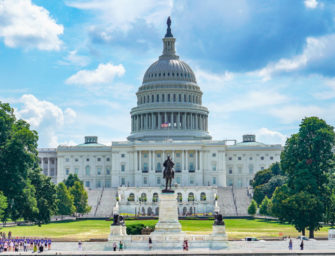Weekend viewing from #AGU20
We wrapped up the second week of #AGU20 on Friday! Be sure to check out these sessions and events on-demand – you can even catch up on the couch this weekend. All recordings and posters will be available to attendees until 15 February.
- Howard Frumkin delivered AGU’s inaugural GeoHealth Plenary, “Planetary Health: Where the Geophysical Meets the Biomedical (on a Global Scale),” discussing the concept of a life preserver fostering, or saving, human and planetary health. And Baba Brinkman created another custom #AGU20 wrap up rap for the day.
- A Union Session examined how to implement AGU’s “Science for Solutions” to address societal problems.
- Three Named Lectures provided Earth system perspectives inspired by Carl Sagan, and on ocean science and artificial intelligence.
- Two press conferences unveiled new results from the Juno mission and new research on wildfire-driven thunderstorms.
- An eLightning session included Arizona State University graduate students who taught Earth and space science to incarcerated individuals in the state prison.
- Two Union sessions explored the argument that the creation and legacy of western science has erased and/or delegitimized non-western scientific methodologies, and how we can use our science in collaboration with decision makers, communities, and other stakeholders to benefit society.
Check out these sessions on demand or in the poster gallery:
- V029 – Volcanic Hazards: From Monitoring to Impacts I
- NH022 – Concurrent, Consecutive, and Cascading Events: An Emerging Challenge for Risk Assessment and Management of Compound Natural and Natech Hazards III Posters
- SY041 – Science and Society: Science Communication Practice, Research, and Reflection II eLightning
- PP032 – Spatial and Temporal Variability of Dust Emissions and Transport: Importance of High-Latitude Sources and Insights from Paleodust Archives I Posters
- GC079 – Economics and Econometrics of Climate Change: Drivers, Impacts, and Policy Levers I eLightning
- S040 – Seismology Contributions: Earthquakes I
- A111 – Advances in Interactions of Air Quality and Public Health Using Integrated Modeling Frameworks I Posters
- G010 – Observing Geophysical Signals in the Climate System Through Geodesy eLightning
- EP040 – The Role and Relevance of Thresholds and Variability Across Landscapes I
- DI018 – Characterizing the Dynamic Upper Mantle Using Multidisciplinary Approaches I
- T036 – Effects of Heterogeneities on the Strength of the Crust and Mantle I
- P050 – Balloons in Earth and Planetary Sciences: Research, Applications, and Emerging Concepts I eLightning
- SH030 – Impacts of Variability in the Middle Corona I Posters
- C040 – Controls on Marine-Terminating Glacier, Ice Stream, and Ice Shelf Dynamics in Observations and Models I
Here are some posters that you will want to add to your schedule:
- https://twitter.com/SuperMossSophie/status/1337380235097083912
- https://twitter.com/BoilingWoo/status/1337376587994472451
- https://twitter.com/ChrisClavin/status/1337181428883349505
- https://twitter.com/TomPughLab/status/1337365118133395458
- https://twitter.com/mckennach/status/1337386650318630912
- https://twitter.com/arvindpawan1/status/1337391012273065985
News coming out of #AGU20 includes:
- Beast of the Central Arctic. Eos, 11 December. Feast your eyes on Beast, the first remotely operated vehicle to brave the Arctic for 1 year, and listen to the accompanying special podcast. Session on Monday!
- Earth’s Magnetic Field Holds Clues to Human History. Eos, 11 December. Items burned in the sacking of ancient cities are time capsules of geomagnetic data. Session on Tuesday!
- Coastal Brazil Is Likely to Face More Heat Waves and Droughts. Eos, 11 December. In 2014, São Paulo experienced its greatest water crisis ever, caused by an intense drought. New research indicates that it is likely to happen again and be even more severe.
- Climate Inequality Exists in U.S. Cities and Has Deep Racist Roots. Scientific American, 10 December. Lower-income residents and people of color are more likely to live in the hottest neighborhoods in cities across the country, putting them at greater risk of heat-related illnesses and death.
- The Solar Orbiter is watching a new sun weather cycle begin. Scientists are thrilled. com, 11 December. Just two weeks after the sun produced its first medium-size flare of the new solar cycle, scientists offered an update on what the newest sun-studying spacecraft has been up to.
Finally, some things we saw on Twitter:
- Rachel Glade looks very comfy, meanwhile Ciaran Harman looks a little less comfy…
- Anyone else like Kelly Wrighton? We know the “mullet” style – business attire on the top and PJ’s on the bottom. Or have a favorite science t-shirt like David Themens?
- Thanks to Jessie Pearl for reminding us to polish your trees (yes, AI captions aren’t perfect…)
- We are flattered by the #AGU20isthenewNetflix discussions!
- Austin Elliott is in San Francisco and trying to recreate the Fall Meeting experience.
- Room Rater gave West Virginia University’s Dr. Tu an 8 out of 10 for her amazing background!
Note: not all recordings of live sessions may be available at the time of this post, but they will be available in the coming days. Please check the online platform for updates.



There are no comments
Add yours